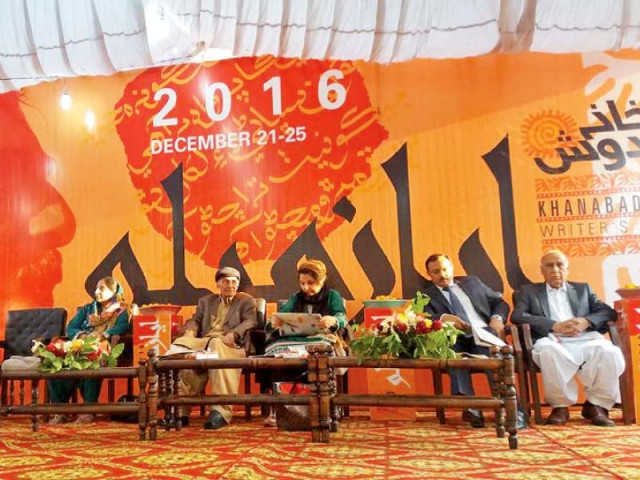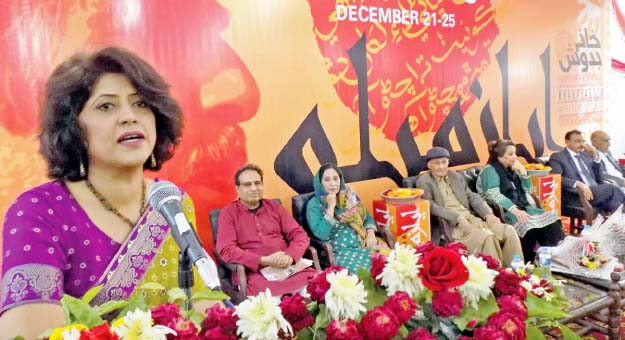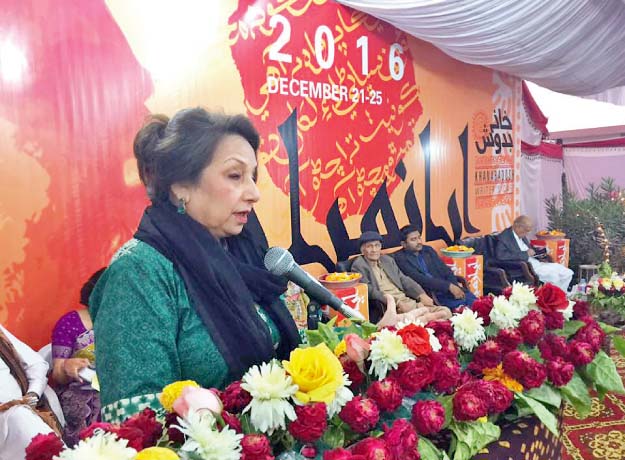Remembering literary figure: Five-day Ayaz Mela kicks off
Contemporaries recall work of Shaikh Ayaz at inaugural session

Speakers paid tribute to Sindhi poet Shaikh Ayaz and his desire for a political awakening in the province. PHOTOS: ADEEL AHMED/ SINDH EXPRESS
The Ayaz Mela 2016 has been organised at Cafe Khanabadosh. It is for the second time that this festival is taking place at this cafe owned by Amar Sindhu and her team, featuring literary and academic discussions, poetry and music. Ayaz wrote over 50 books, including a few of Urdu poetry. Revolution and romance were the dominant themes in his works. He died on December 28, 1997, and was laid to rest near the shrine of Hazrat Shah Abdul Latif Bhitai in Bhit Shah.
At the event, contemporaries and fans of Ayaz (1923-1997) appeared engrossed in his reminiscence, recollecting his endeavours for political awakening and education of Sindhis. The evening sessions provided indulgence in musical nights and a mushaira.

Veteran politician and constitutional lawyer Rasool Bux Palijo, Ayaz’s son, Moonis Ayaz, and daughter, Yasmeen Muzaffar, MPA Mahtab Akbar Rashdi, former advocate-general Yousuf Laghari and Hyderabad Commissioner Qazi Shahid Pervez attended the festival’s inauguration. “He inspired the youth of Sindh during [Ayub Khan’s era] when talking about Sindhi nationality was considered a crime,” recalled Palijo, while addressing the inaugural session. “That was the time when even Islam and Marxism were being wrongly interpreted.”
Eighty-six-year-old Palijo said that he, centenarian poet and intellectual Ibrahim Joyo and Palijo’s wife, late Zareena Baloch, who was a singer, formed a music lovers club for Ayaz. “We made songs from his poetry that Zareena sang. She used to say that when she sings Ayaz [his poetry], the people don’t even clap hands,” he said, adding that he would always encourage her by saying that they are introducing modern Sindhi literature to the people through these songs. Palijo described Ayaz as a pithy writer and speaker, whose few words encompassed broad ideas and meanings.
“My father was a nationalist who loved humanity,” said Ayaz’s son, Moonis, who is also a poet. The late poet’s family regards Ayaz as a conservative at home. The state declared him a fifth columnist in reaction to his poetry during 1965 war with India. The Sindhi nationalists, subsequently, also accused him as a traitor when he assumed the official responsibility of working as vice-chancellor in Sindh University, a position he assumed on an offer from Zulfikar Ali Bhutto.

“Ayaz is a poet of past, present and future,” said MPA Mahtak Akbar Rashdi. She credited Ayaz for liberating the Sindhi poetry from the influence of Persian language. “His words envelope the universe,” she added. According to advocate Yousuf Laghari, Ayaz showed the people of Sindh the way to survive through Ayub Khan’s repressive martial law and the One Unit system.
The event’s organisers, Prof Amar Sindhu and Prof Arfana Mallah, thanked the people for showing great interest in the ongoing festival and the previous one that was held last year. “I conceived the idea of organising such an event in 2000. But I was always constrained by resources,” Sindhu said while expressing her gratitude to all the people who have helped them arrange the five-day festival.
Published in The Express Tribune, December 23rd, 2016.



















COMMENTS
Comments are moderated and generally will be posted if they are on-topic and not abusive.
For more information, please see our Comments FAQ